 Think your cell phone location is private? Think again…
Think your cell phone location is private? Think again…
Privacy advocates took a major blow this week with a 4th Circuit Court of Appeals 12-3 ruling on cell phone location data. The decision out of Virginia upheld that consumers have “no reasonable expectation of privacy” because the information is ‘willingly given’. In other words, because you ‘agree’ to use your location in cell phone services and apps, that information can be collected and used without a warrant.
The Fourth Amendment to the U.S. Constitution protects personal privacy and the right to be free from ‘unreasonable government intrusion’ into their persons, homes, businesses, and property. The “search and seizure” protections require law enforcement agencies to obtain a warrant from the court to so intrude, with an exception – the “third-party doctrine”.
Under this legal theory, consumers who knowingly and willingly surrender information to third-parties have “no reasonable expectation of privacy” in the information provided – regardless of how much information there is, or how revealing it may be. Research clearly shows that cell-site location data collected over time can reveal significant personal information — including where you live, where you work, when you travel, who you meet with, and who you sleep with. So when do you willingly surrender that data? … More often than you think.
Unfortunately, technological growth outpaces the law. As our society becomes more and more dependent on the technology we use, and we grow more numb and complacent to the services required for that use, an increasing burden is placed on our legal system to keep up and evolve. In the meantime, consumers must remain vigilant in understanding what rights and protections they sign away for the conveniences provided.
